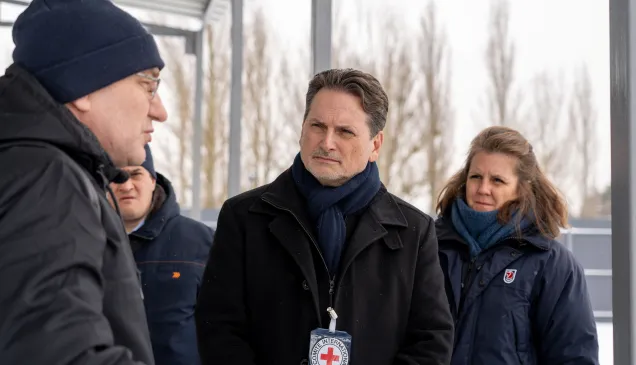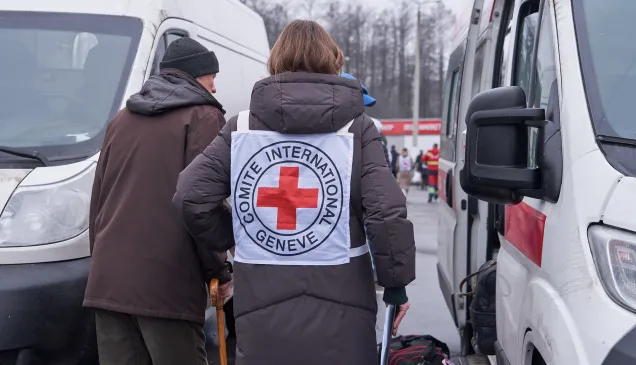Ukraine: "Level of death, destruction and misery abhorrent and unacceptable"
Speech given by Mr Peter Maurer, President of the International Committee of the Red Cross, at the High-Level International Donors’ Conference for Ukraine; Warsaw, 5 May 2022, on behalf of the Red Cross and Red Crescent Movement, comprised of the International Committee of the Red Cross, the International Federation of Red Cross and Red Crescent Societies, the National Societies responding to the crisis and those supporting our collective mobilization.
The level of death, destruction and misery of civilians affected by the international armed conflict in Ukraine is abhorrent and unacceptable.
I am addressing you today, in your capacity as High Contracting Parties of the Geneva Conventions, on the issues at the heart of our mandate – the lifesaving impacts of humanitarian action and international humanitarian law.
Importantly: International humanitarian law, or jus in bello, is concerned the ways in warfare is conducted. It is solely humanitarian, seeking to limit the suffering caused. Crucially, it is independent from questions about the justification or reasons for war, or jus ad bellum.
The Geneva Conventions and Additional Protocols identify critical issues where the consensus of the parties is vital to offer a minimum of humanity in conflict: so that civilians and wounded people are protected, so humanitarian aid can reach those in need, so that prisoners of war are treated humanely, so that people do not disappear, so that mortal remains are collected in a dignified manner. The law is also clear on the obligations to respect and ensure respect for international humanitarian law, including to facilitate the access of humanitarian action. Access is an obligation, not a point of negotiation.
The ICRC knows that reaching consensual agreements on humanitarian issues is challenging. We appreciate the agreements that been made by the parties - for example in the safe passage arrangements allowing people to leave areas of hostilities, such as recently in Mariupol. Progress has been too slow and too little... it has led to senseless deaths and prolonged suffering. But we have seen the potential for agreements to be made and we implore parties to make expanded efforts to save lives.
Today, the generous funding of humanitarian action for people impacted by the conflict is critical. But it is only part of the picture: to meet the needs of the civilian population, funds must be equitably operationalized. For this, the space for neutral, impartial and independent humanitarian action must be protected: so that those in most need can be served, without discrimination as to nationality, race, religious beliefs, class or political opinions, wherever people are.
Already present for eight years, the ICRC with the Ukrainian Red Cross Society, is massively scaling up its response. Our support in places Kyiv, Mariupol, Odessa, Donetsk, Luhansk and elsewhere includes emergency assistance such as food, water, and other essential items. We are supporting hospitals and primary healthcare facilities with medical equipment and emergency preparedness. We are working on mitigating the impact of weapons contamination and helping repair damaged water stations and homes.
Tens of thousands of local Red Cross and Red Crescent volunteers and staff across Europe are working tirelessly to provide support to those in need. The International Federation of Red Cross and Red Crescent Societies and National Societies and its member National Societies have already reached more than a million people affected by the conflict with life-saving aid.
The strength of the Red Cross, the largest humanitarian organization in the world, is our combination of community-based and global support. Our experience shows us that to have maximum impact we need to work closely with communities, to strengthen the capacities of local actors; and to work with and through governments and local authorities. Our aim is to support the development of capacities to the local structures leaving them stronger, more robust.
Excellencies, ladies and gentlemen
The foundations for reconstruction in Ukraine must be laid today to avoid further human suffering.
Services vital to the survival of the civilian population – water, electricity, healthcare, must continue. Maintaining these services in coming weeks and months will avoid reverberating secondary impacts and mitigate further degradation in the longer term. In this way frontline humanitarian action is a vital stabilizing factor in fragmented environments and a building block towards moments of reconciliation and broader peace-building efforts.
Those living through the horrors of this conflict need urgent and pragmatic solutions for now and for the future. I urge you to support principled humanitarian action, to do your part in championing respect for international humanitarian law.
Thank you.



